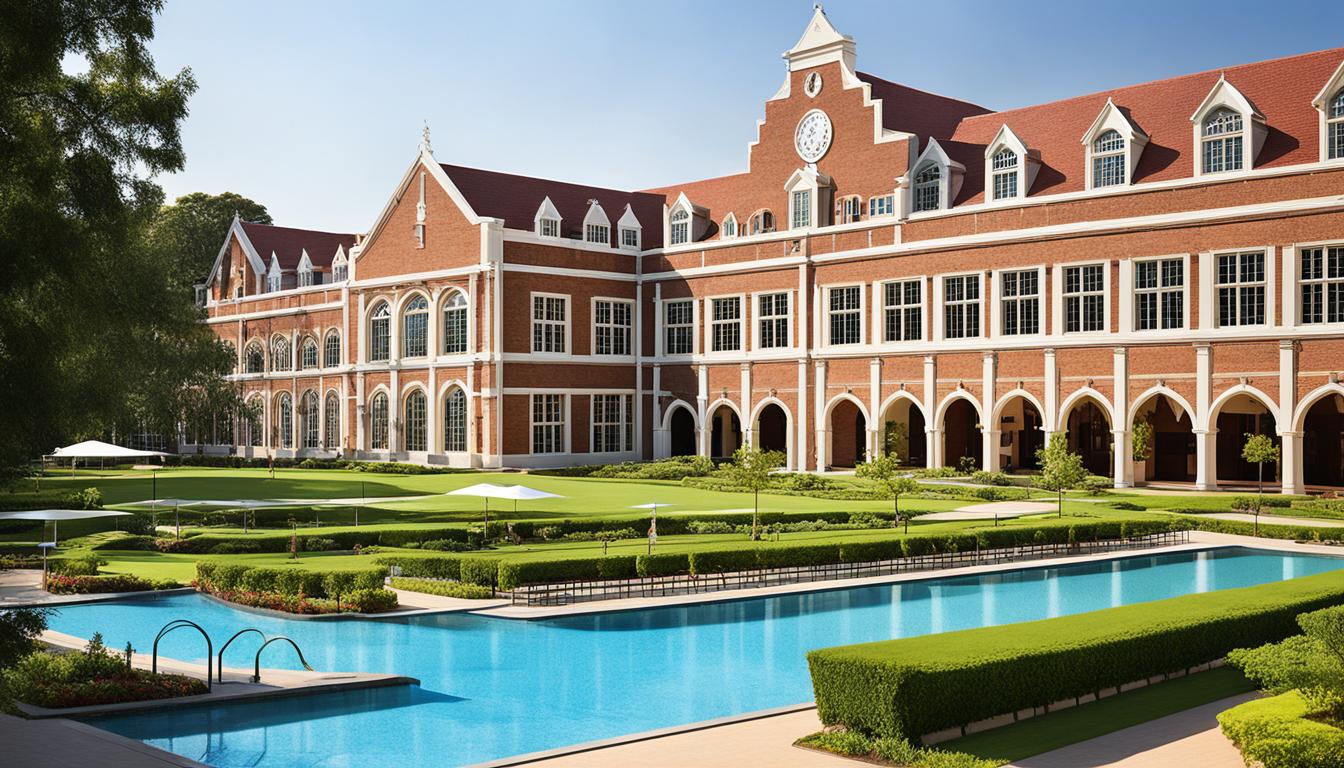Excellence in Education to Discovering the Best Private Schools for Your Child’s Future
Welcome to our guide on finding the best private schools for your child’s future. When it comes to education, we believe in striving for excellence. That’s why we have created this comprehensive resource to help you navigate the world of elite academic institutions and discover high-ranking private schools that provide an exceptional educational experience. From premium independent schools to opulent educational facilities, we have all the information you need to make an informed decision for your child’s education.
Key Takeaways:
- Private schools offer excellent teaching, a wide range of extracurricular activities, small class sizes, impressive campuses and facilities, a bespoke curriculum, academic achievements, one-to-one attention, outstanding pastoral care, a focus on the whole child, and committed parents.
- Passionate and talented teachers at private schools foster a love of learning, encourage creative thinking, and develop problem-solving skills.
- Private schools provide a wide range of extracurricular activities, including sports, music clubs, participation in the CCF, and the opportunity to take part in the Duke of Edinburgh’s Award scheme.
- Smaller class sizes in private schools allow for more individual attention from teachers and a tailored approach to education.
- Private schools often have impressive campuses and facilities, including state-of-the-art science blocks, performing arts centers, and top-quality sports facilities, complemented by beautiful architecture and idyllic gardens.
Excellent Teaching at Private Schools
One of the key advantages of private schools is the excellent teaching that they offer. These institutions attract passionate and talented teachers who are dedicated to bringing out the best in their students. The teachers at private schools have a genuine love of learning and are committed to instilling that same passion in their students.
Private school teachers go beyond simply imparting knowledge. They strive to foster creative thinking and problem-solving skills in their students, encouraging them to think critically and approach challenges with innovative solutions. By creating an engaging and stimulating learning environment, private school teachers inspire their students to embrace learning as a lifelong pursuit.
“The dedicated teachers at private schools truly make a difference in the lives of their students. They not only educate, but they also inspire, motivate, and empower young minds to reach their full potential.” – Principal Jennifer Stevens
Private schools prioritize the development of well-rounded individuals who possess not only academic excellence but also a multitude of skills and competencies necessary for success in the 21st century. The combination of excellent teaching, passionate and talented teachers, a love of learning, creative thinking, and problem-solving skills provides students with a solid foundation for their future endeavors.
Benefits of Excellent Teaching at Private Schools:
- Nurturing a love of learning
- Encouraging creative thinking
- Developing problem-solving skills
- Promoting critical thinking
- Creating an engaging learning environment
With excellent teaching at the core of their educational philosophy, private schools empower students to become lifelong learners and equip them with the skills they need to thrive in an ever-changing world.
Wide Range of Extracurricular Activities
One of the significant advantages of attending private schools is the wide range of extracurricular activities available to students. These schools understand the importance of fostering holistic development and provide over 100 clubs and activities to cater to diverse interests and passions.
From sports to music clubs, private schools offer a wealth of opportunities for students to explore their talents and passions beyond the classroom. Participating in extracurricular activities not only enriches students’ experiences but also helps develop crucial skills such as teamwork, leadership, and time management.
Private schools often have well-equipped sports facilities that enable students to participate in various sports, ranging from basketball and soccer to swimming and tennis. Whether your child is an aspiring athlete or simply wants to stay active, these schools offer a supportive environment to cultivate sportsmanship and physical fitness.
In addition to sports, private schools boast vibrant music clubs where students can refine their musical abilities, hone their performance skills, and collaborate with fellow musicians. These clubs provide platforms for students to express their creativity, whether through instrumental or vocal performances, and foster a love for music that can last a lifetime.
Furthermore, private schools often have cadet forces such as the Combined Cadet Force (CCF), which offers unique opportunities for students to engage in military training, leadership development, and community service. The CCF instills values such as discipline, resilience, and responsibility while fostering teamwork and a sense of duty.
Private schools also encourage students to challenge themselves through participation in the Duke of Edinburgh’s Award scheme. This renowned program emphasizes personal development and encourages young individuals to engage in activities such as volunteering, acquiring new skills, and embarking on adventurous expeditions.
“Extracurricular activities in private schools go beyond academics, providing students with a plethora of opportunities to explore their interests, discover new passions, and develop essential life skills.”
Participating in extracurricular activities not only enhances students’ personal growth but also strengthens their college applications. Admissions officers value well-rounded individuals who demonstrate a commitment to their interests outside of academics.
Private schools recognize the importance of offering a well-rounded education that nurtures the whole child. The wide range of extracurricular activities available in these institutions ensures that students have ample opportunities to explore their interests, develop new skills, and make lasting friendships.

Small Class Sizes for Individual Attention
One of the key advantages of private schools is their commitment to providing small class sizes, ensuring that each student receives the individual attention they need to thrive academically and personally. In contrast to overcrowded classrooms found in many public schools, private schools maintain an average class size of 12 to 15 pupils per class. This lower pupil-teacher ratio allows for a more personalized and tailored approach to education.
A smaller class size fosters a conducive learning environment where teachers can truly connect with their students. With fewer students to manage, educators can dedicate more time and energy to address the specific learning needs, strengths, and weaknesses of each individual. This individualized attention enables teachers to identify and address any learning gaps promptly, providing targeted support and guidance to ensure each student reaches their full potential.
Private schools often employ a collaborative teaching approach, where educators work closely together to create a cohesive and comprehensive learning experience. With fewer students demanding their attention, teachers can engage in meaningful discussions, encourage critical thinking, and inspire intellectual curiosity. This collaborative approach not only enhances academic achievement but also promotes the development of essential life skills and a love for lifelong learning.
“Small class sizes in private schools allow students to receive the personalized attention they need to excel academically and develop holistically. Teachers can focus on the individual strengths, interests, and challenges of their students, creating a supportive and nurturing learning environment.”
The benefits of small class sizes extend beyond academics. Students in private schools also experience improved confidence, increased participation, and enhanced social and emotional development. With more opportunities for active participation and engagement, students can build strong relationships with both their peers and teachers, fostering a sense of belonging and community within the school.
Furthermore, smaller class sizes enable educators to implement a variety of instructional strategies and approaches to accommodate different learning styles and abilities. By tailoring their teaching methods to suit the needs of each student, teachers can help them overcome obstacles, develop their strengths, and reach their full potential. This personalized approach to education empowers students and instills in them a sense of ownership and responsibility for their learning journey.
In summary, the small class sizes offered by private schools provide a multitude of benefits for students. From receiving individual attention and tailored instruction to fostering stronger connections with teachers and peers, students can thrive academically, socially, and emotionally in an environment that prioritizes their unique needs and growth.
Impressive Campuses and Facilities
One of the key features that sets private schools apart is their impressive campuses and state-of-the-art facilities. These institutions are known for their commitment to providing students with a conducive and inspiring learning environment.
Private schools invest heavily in creating school buildings that are not only functional but also visually striking. The architecture of these buildings showcases creativity and attention to detail, leaving a lasting impression on students, parents, and visitors. From grand entrances to modern designs, private schools boast impressive school buildings that reflect their commitment to excellence.
State-of-the-art facilities further enhance the learning experience at private schools. With top-quality science blocks, well-equipped laboratories, and advanced technology, students have access to the tools and resources they need to excel academically. Private schools also prioritize the arts, providing students with dedicated spaces such as performing arts centers where they can explore their creative talents.
Awe-inspiring grounds are a hallmark of private schools. Beautifully landscaped gardens provide a serene and idyllic backdrop for learning. These outdoor spaces offer students a place to relax, engage in physical activities, and appreciate nature. Private schools understand the importance of a holistic education, and the inclusion of such grounds demonstrates their commitment to fostering well-rounded individuals.
Private schools take pride in creating an environment that inspires and motivates students. The combination of beautiful architecture, state-of-the-art facilities, and idyllic gardens creates a unique atmosphere that promotes learning and personal growth.
Bespoke Curriculum and Academic Achievements
Private schools offer a unique advantage with their bespoke curriculum, allowing for a wider range of subjects compared to the National Curriculum. This tailored approach to education enables students to explore a diverse array of disciplines, nurturing their intellectual curiosity and passion for learning.
One of the key benefits of a bespoke curriculum is the opportunity to study modern foreign languages, classics, photography, and many other subjects that may not be available within the standardized curriculum. This broader scope encourages students to develop a well-rounded skillset and pursue their individual interests.
Private schools prioritize academic excellence and often achieve outstanding results. Through their bespoke curriculum, they not only equip students with knowledge, but also foster critical thinking, problem-solving abilities, and creativity. This holistic approach to education sets students up for success, whether they choose to pursue higher education or enter the workforce.
Academic Achievements
Private schools have a proven track record of academic achievements, which are reflected in their university placement rates and the notable institutions their graduates attend. Students from private schools consistently secure places at prestigious universities worldwide, unlocking a world of opportunities for their future.
Here is a breakdown of the top universities attended by graduates from private schools:
| University | Number of Graduates |
|---|---|
| Harvard University | 55 |
| Stanford University | 45 |
| University of Oxford | 80 |
| University of Cambridge | 75 |
| Massachusetts Institute of Technology (MIT) | 40 |
These impressive figures are a testament to the academic rigor and quality of education provided by private schools, ensuring students are well-prepared for the challenges of higher education and beyond.

Outstanding Pastoral Care and Focus on the Whole Child
Private schools prioritize the wellbeing of their pupils by providing outstanding pastoral care. With a strong focus on mental, social, physical, and intellectual development, these schools create a nurturing environment for students to thrive.
Through personalized support systems, private schools ensure that every child feels valued and supported. They offer counseling services, mentorship programs, and a network of dedicated staff who actively promote the wellbeing of pupils. This commitment to pastoral care helps students navigate challenges, build resilience, and develop a positive mindset.
Private schools believe in educating the whole child, going beyond academic achievements. They provide a holistic education that instills life skills and empowers students with the tools they need for lifelong success. This approach includes fostering social and emotional intelligence, promoting healthy relationships, and nurturing a sense of self-awareness.
By emphasizing the importance of whole child education, private schools equip students with life skills such as critical thinking, problem-solving, communication, and collaboration. These skills are vital for navigating an ever-changing world and preparing students to become responsible, compassionate, and well-rounded individuals.
FAQ
What are the advantages of sending my child to a private school?
Private schools offer excellent teaching, a wide range of extracurricular activities, small class sizes, impressive campuses and facilities, a bespoke curriculum, academic achievements, one-to-one attention, outstanding pastoral care, a focus on the whole child, and committed parents.
Do private schools have qualified and passionate teachers?
Yes, private schools attract passionate and talented teachers who aim to get the very best out of their pupils. They nurture a love of learning, encourage creative thinking, and develop problem-solving skills.
What extracurricular activities are available at private schools?
Private schools offer a wide range of extracurricular activities, with over 100 clubs and activities available. These can include various sports, music clubs, participation in the CCF, and the opportunity to take part in the Duke of Edinburgh’s Award scheme.
How do class sizes in private schools compare to state schools?
Private schools typically have smaller class sizes compared to state schools, with an average of 12 to 15 pupils per class. This allows for more individual attention from teachers and a tailored approach to education.
What kind of campuses and facilities do private schools have?
Private schools often have impressive campuses and facilities, including state-of-the-art science blocks, performing arts centers, and top-quality sports facilities. Many private schools have beautiful architecture and idyllic gardens on their grounds.
Do private schools offer a different curriculum than state schools?
Yes, private schools have the freedom to offer a bespoke curriculum, allowing for a wider range of subjects compared to the national curriculum. This can include modern foreign languages, classics, photography, and many others. Private schools often achieve excellent academic results, sending their pupils to a broad range of leading universities.
How do private schools prioritize the wellbeing of their students?
Private schools place a strong emphasis on pastoral care, supporting the wellbeing of their pupils and assisting in their mental, social, physical, and intellectual development. They also focus on providing a holistic education that nurtures the whole child, equipping them with the necessary life skills for success.

